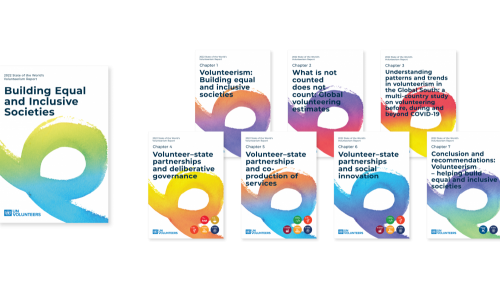
https://swvr2022.unv.org/key-messages-and-policy-recommendations/
Policy Recommendations
Policymakers can adopt policies to ensure access and inclusion in order to facilitate marginalized groups and volunteers’ participation in decision-making processes. Policies aimed at promoting partnerships between volunteers and government and other entities, including the private sector, can be important in engendering the development of such partnerships.
Leverage partnerships through volunteering:
Policymakers should leverage existing support networks, volunteering practices and values when developing policies on volunteerism. Recognizing the importance of partnerships among volunteers, volunteer-involving organizations and government, Bangladesh is co-creating a National Volunteer Policy with various stakeholders that aims to embed volunteerism within the national development policies and significantly strengthen local government institutions.
Address gender-related volunteering inequalities:
Policymakers can adopt gender-sensitive measures that can optimize women’s participation in volunteering; for example, by ensuring they have access to decision-making processes. Understanding ongoing barriers that women face in volunteering is important. Studies that assess how participatory governance processes reinforce or challenge gender norms, as well as other gender inequalities in volunteerism across countries and regions, can help close this gap.
Leverage volunteers’ expertise, knowledge and experiences:
Policymakers should recognize the expertise of volunteers and implement measures to facilitate or create an enabling environment for the full utilization of their skills. Policymakers should also consider building on the strong interest in diverse forms of volunteering beyond service delivery, including social innovation and civic engagement.
Promote social innovation
Policymakers should promote measures that support the development of new ideas in order to enable innovations that align with and are more responsive to communities’ development needs. Social innovation requires inclusive policies that enable marginalized groups to engage in innovations.
Recognize informal volunteers’ work and contributions:
Policymakers should consider developing mechanisms for valuing volunteers for the work that they do, from recognizing their opinions and integrating their input in decisions, to other considerations such as social protection for volunteers in marginalized communities. Policymakers should also recognize volunteers’ contributions, including through various forms of incentives such as social recognition to build on their desire to feel needed and valued.
Invest in volunteer data collection and, research and measurement:
Investing in volunteer data, research and measurement is crucial in closing the gap in data on volunteerism and to generate better quality and comparable data that capture the contribution of volunteering to development across countries and regions. Partnershipsto collect data and better measure volunteering with entities at national level—for example, National Statistical Offices—with regional organizations at regional level, and with partners—for example, ILO—at international level can help close the gap in data and measurement.










Add new comment